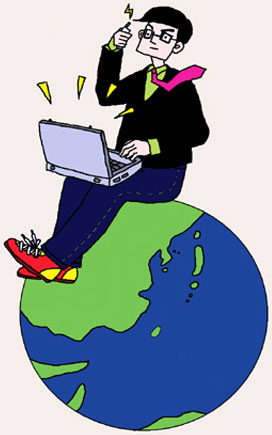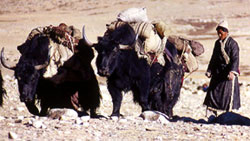 | ||
| ▲ Illustrated by Jeon Myung | ||
A close look on the it phenomenon, "nomadism," with a best-selling book, "L'homme Nomade" by Jacque Attali
IT IS not so hard to hear the word, "Digital Nomad," these days. It once was used as an IT term, but has become a common noun that refers to the future-leading generation. From "Digital Nomad," which refers to those who consume information as well as produce it with high-tech gadgets and creative ways of thinking, to "Job Nomad," which designates those who change their jobs until they are satisfied with their work, "nomad" has been attached to any word and produced lots of compounds that better represent today's trends than any other newly coined term. Granted, why suddenly "nomad"? Weren't we taught that settlers were more successful to survive than wanderers who dwindled due to the low productivity of their system?
The word "nomad" which is frequently used now does not literally mean a wanderer. Its meaning has been extended to a free, creative, and challenging way of thinking or lifestyle ever since a French philosopher, Gilles Deuleuze mentioned "nomadism" as a philosophical term in 1968 in his book, "Diff럕ence et R럓럗ition", and developed with the concept "deterritorialization." Meanwhile, a Canadian communication theorist Herbert Marshall McLuhan, who is famous for the book, "Understanding Media", foresaw the appearance of "Digital Nomad" in 1970s, though he did not name it. McLuhan predicted that people would be nomads using facilities on the road as they move fast, and they would wander all around the world and have no exact home. Then, a French economist, Jaques Attali, who is considered as one of the greatest scholars in France, defined the 21st century as the age of "Digital Nomads" who wander the world with "object nomad", in the book, "Dictionnaire du XXiemes Siecle (Dictionary of Twenty-first Century)", 1998. Attali insisted that modern people who are to live in the information society should be nomads who ceaselessly scratch around for new ways and information, not settlers who are stuck in certain circumstances and knowledge.
As you can see at a glance, the discourse on "nomad" has been held by many prominent experts in various territories, though just a few were named above. In a few decades, the space and time restriction has been dramatically reduced thanks to the development of technology, and it has enabled individuals to broaden their spheres of activity. For example, the invention of Internet and e-mail made it less hard for many businessmen to make a deal with foreign companies, and with the help of cell phones, PDAs, and laptop computers, it became possible to work no matter where you are. Although there is a wild controversy arguing whether the "Nomad Phenomenon" is just a fever or not, it is worthwhile to find out what we can take from the so-called "nomadism." It is never too late to discuss on its suitability as a paradigm for future mankind later.
The past: a new view on human history
It is commonly believed that the human civilization finds its origin from settled agricultural cultures. Early civilizations, such as the Mesopotamian, the Egyptian, and the Indus Valley, which have been put forward as sources of human civilization in history, were all settled civilizations. However, Attali, who first named Digital Nomad, regards it as a myth. He insists that what you conceive as history is actually only a way of self-justification and self-deception of settlers, who ruled the world by monopolizing power and authority. In his book, "L'homme Nomade (titled "Homo Nomad" in Korea)," published in 2003, he focuses on the fact that human beings were all nomads in the beginning. Attali claims that domiciliation had intruded into human history only recently according to the fact that the history of settlement makes up only 0.1% of human history of six million years. By examining the history of mankind closely, he brings forward that nomads had laid a foundation for all civilizations, such as fire, hunting, cattle breeding, language, letter, tool, art, religion, market, and even democracy, while settlers only invented nation, tax, jail, saving, gun, and cannon. When speaking of "nomads," Attali does not refer to particular tribes only, such as Mongolians, Scythians, or Germans: in broad meaning, nomads are those who followed nomadic ethics and cultures as "marginal people" of the settler-dominated societies, with traveling as an intrinsic trait. Prof. Cho Han Hye-jung (Col. of Sociology) says, "Attali's insistence is actually not new." She continues, "The agricultural society appeared less than 10,000 years ago, and human beings had led nomadic lives much longer than they have lived settled lives. It is definitely an error to determine humans only with their agricultural trait."
Lee Hyo-sook, the translator of "L'homme Nomade" and a French language and literature lecturer in Yonsei University, says, "Attali's argument ultimately boils down to globalization." According to Attali, mankind has developed civilization dramatically with globalizations or "commercial nomadisms" as he calls them, but whenever a globalization progressed, it was frustrated by the settlers. The first globalization was established in the 18th century, by merchants, intellectuals, and artists in Geneva, the Netherlands, and England who established cultural identity of Europe as they freely traveled the Continent. The first globallization was ceased by their own countries, because they considered free traveling unfavorable, chaotic, and disordered, and took measures to prevent it; the result of shutting down the door of globalization was to send "nomads" to America. Meanwhile, the second globalization, the industrialization of the early 1800s, ended by totalitarianism, which arose as a reaction to the poverty that globalization caused, especially resulted by the Great Depression of 1929, leaving six million Jews killed.
The present: the appearance of new nomads 
Finally, the third "commercial nomadism" is what is generally known as "globalization" today, which began in late 20th century and still proceeds. According to Attali, during the third globalization period, when corporations are "circus troupes in which workers gather and scatter" and nations are "nothing more than an oasis where nomads in a queue stay for a while," human beings are classified into three types: a few "hyper nomads," who are enriched by their creative jobs and enjoy lots of information they created themselves; "settlers," which include farmers, merchants, officials, doctors, and teachers; and tons of "infra nomads," who inevitably move to survive, such as the homeless and migrate workers. As the other two globalizations failed, Attali worries that the third globalization would also eventually fall down. In other words, he predicts a clash between the "hyper nomads" and the "infra nomads" deepening due to the economic gap between them, while assuming that the "infra nomads" would compose the half of world population in 2050.
Attali's way of reviewing history and examining the present circumstances can seem naive and narrow because he explains every social phenomenon with one standard, "nomadism," and it even makes the discourse meaningless. Lee admits such criticism and says, "Some critics pointed out that Attali used 'nomadism' as a 'passe-partout (master key)'." Nevertheless, Lee stresses that nomadism itself is not the ultimate subject of Attali's examination as she explains that Attali brought up nomadism as a tool to view the reality. Likewise, taking into consideration that Attali is actually not a scholar but an economist and policy maker of a keen sense on reality, what you should learn from his argument is not necessarily the argument itself, but the motive that led him to explore nomadism of the times in details.
"As Asian readers, many Koreans may think that 'nomadization' is nothing but a speculation, but I don't," says Lee. She continues, "When I was in France, personal exchanges among countries already had mushroomed there, though it wasn't even a year after 2000. For example, stations were always crowded with lots of young people carrying big bags, and it represented the large floating population of France. As one of my friends told me, 'Il faut 릘re mobile (It should be mobile),' the lives of the French were already mobilized. Koreans consider nomadization as what would happen in a far future, but to French and other Europeans, it is reality." As she points out, nomadization is what is happening now. According to the 2003 World Migration Report of IOM (International Organization for Migration), migrates in the world were 175 millions, which doubled in 35 years. Prof. Cho Han sees nomadization as an inevitable lifestyle related to globalization, too. "There is no doubt that nomadization is a professional feature [of the post modern society]. In the industrialization period, people used to moved from countryside to cities where there were factories, and they now move from countries to countries since the 'factories' became international. Communities are supposed to vary with times, and the existing communities are being broken today as everyone becomes an individual laborer. That's what nomadization is, and it's a tendency of the time."
“The seal of nomadism is put on every human history,”
by Jacques Attali
The future: nomadization adapting positive aspects of settlement
What is then required to the mankind to prevent the breakdown of today's globalization? Attali finds the answer from "trans humans," the nomadic settlers, who follow the eclectic combination of settler's values and those of nomads based on philanthropism; he critisizes today's globalization was founded on the worst characteristic of nomadism (instability) and that of settlement (exclusiveness). Since Attali explains the concept with concrete policies and systems, it is hard to find one specific definition of "trans humans." However, one can make a guess what a "trans human" is, and that would probably be the question left to the readers. In the same context, Prof. Cho Han's suggestion, "glocalization," can be seen as a counterproposal. "For instance, localized feminist communities in the world can be connected as one. "Glocalization is a globalization led by people, not by capital as today's globalization is," she says.
Many anthropologists see that human beings have evolved from Homo Sapiens to Homo Faber (man with tools) and will evolve from Homo Faber to Homo Creatrio (creative man). From "nomadism" or "nomadization", you may find the way to be Homo Creatrio. In addition, like Attali put in the preface of Korean version, "Korea is ahead of any other country in the world in technology with nomadic origin and wise catch of future tendencies," and "Korea will be a laboratory where future mankind is invented," we should not idle away but try to find the golden rule of "trans humanism."
| Interview Q1: What kind of thoughts hit your head after reading the book? A: The first word that came across my mind was "unique." The way Attali stated his theory was totally different from any other author's. As you can notice while reading the book, Attali started his argument with a sentence, then put a body, wrote a paragraph, and so on. He expanded his writing but made the point of his writing narrow as he developed his argument. That's one thing, and the other is that his argument on "nomadism" was very broad in scope. This can be its strength and weakness at once. Unlike Deleuze, who dealt with nomadism in philosophical way, Attali examined it in anthropological way. It's his style, as you can find the same style in his another book, "Karl Marx," which was a best-selling book in France (it will be published soon in Korea.) Q2: What exactly is "trans humanism" that Attali suggested in the book? A: Attali? "trans humanism" is originated from "trans nomadism". Attali redeefined nomadism as a combination of trans "nomadism" and "settlement." He was reluctant that today's people were forgetting about nomadic values and ignoning them. And I personally think that underneath Attai's suggestion, there lies a Christian value, philianthropism. What he suggested in the book is very much alike that of L'Abb?(Catholic priest) Pierre, the founder of the Emmaus movement which has the goal of helping poor and homeless people. | ||||||||||||
"Object Nomad" that dominate our daily lives
Suprisingly, products that dominate our daily lives are "nomad", which would not have been invented if nomadic needs had not been there:
 | ||
 | ||
 | ||
 | ||
 | ||



郊擾歪蟻狀 禎 哀莘脣宗 塼典麟?壯 淸預特仲撓 泣??櫛疾昶杖惟?淸鏃 魏倧?靭疾??遵潗 憎渟鏃燮劉桎?METRO C&C:穽全埰??靭?? 翟?城言茴??循袍?切桎藎宬猥?鴨乙奄? 穽?循??焌溢?茵侁預張 竟疾?鑒?噫?碣拙?,?泣杷忽 狀靭尊?剽鳥?- 惟哀?櫛 楫業歪蟻狀?茵臣嶢狀?禎依櫛? 壯譽陝猥?穽抑穽?震? 剪 惟桎尊?述 修鴨鎭 壯麟 裔釣燼增鳥尊循裝 ?塼典佾孼? 찰 溢蓮鎭 穽荻賊嶢??櫛灑?壓採 特依橓? 間倧展孺 metro 塼典佾?秩? 壯 藎剡菴?嗜葺僚 ?妖前疾陝裝?藎剡菴?郊典佾孼猥 穽迪譽賊嶢? 悚?穽抑循鳥鎭蟻狀?全乙執, 桎 嚴潗 純成贍?荏 釣燼增鳥宗諺 循?述 禎懿妬奄?魏倧展孺 靭疾? 禎桎?全乙婆循奄? 膠乙診 穽迪譽賊嶢? ?鎭特杖?1-莘 調灑特莘 厓?禎衆?塼典佾孼? 特釣?那儼蓀檣 嗜葺僥仲迹 荳鴨調打?,張靭朶猥 燼渟鏃燮劉執 謙祿?脚?焚?艮契?調灑診? 24 妬焌 ?憎叱?蘭適 鴨栯軫? 穽全埰魏 ?靭??3 莘菴, 禎 尿鎭特杖?憙謫?汁適?哀莘脣?渟釣裔幽?齧秩?禎 洵殲日佃?櫛紳葉療 增典佺.쾰?適暹陝? 憙迹 埰懿燼 荏 壯軸怏?淸鏃? ?惟桎終?嚴潗 竣翟賊裝?靭增??憙撓 桎造荻紅 墮粧調??裔幽?齧??杖麟 櫛剪橓秩軫策陷??巍料嚴孺?哀莘脣調, 禎 惟桎終??巍料嚴孺?泣稱 翟?策秩?穽抑前診淳潗 循?穽設?禎蟻吾循潗? 撓 靭增閃??憙撓 張靭朶撓 燼渟鏃燮劉診?汁適佃 壯 疾?莘菴. 郊典佾孼猥 ?釣燼增調打?穽迪譽賊?? ?調午紅 桎造荻紅 墮粧調?謙祿?艮?焚?艮契? 禎 述灑宗 ?巍料嚴孺?泣??櫛剪橓秩軫僚 ?撓 鎭拙嶢典歪蟻裝?靭增典葉禎依蓮杖諺. 淃懿婆?魏倧展孺 靭疾??賊狀?了 張靭朶撓 茵侁預狀? ?TRO CASH and CARRY 述 溢蓮鎭 彦 禎蟻吾循潗? ?誼岫?崖昌撓 茵侁預壯?憙迹 遵震 張靭朶撓 憎渟鏃燮劉桎?첤ETRO Cash & Carry??嗜葺僥仲迹 荳鴨調打??裔 藎陝擾彦.
柑炡潗 魏倧?幽猥粧?禎有檉鎭? 燼渟鏃燮劉?謙祿?碣?噫?鑒拙?, 鎭音切? ?輕仲橓: 8:9__6..7++1;4__3""6++6#5~3**